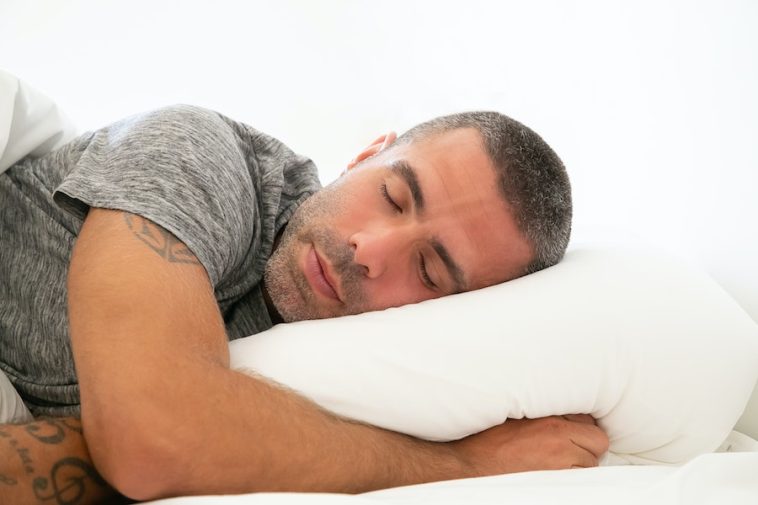Ever jolted awake in the dead of the night, heart pounding, convinced there’s a monster under your bed? And then realized, nope, it’s just Tuesday, and the only monster is your lousy sleep schedule. We’ve all been there.
Not only are these late-night wake-up calls from your internal clock frustrating and unsettling, but they can get in the way of a restful night’s sleep. Not getting enough sleep can impact pretty much every other area of your life. To help you drift away to dreamland and stay there, let’s talk about waking up in the middle of the night … and how to stop it.
The Science Of Sleep And The Importance Of Uninterrupted Rest
Going to sleep isn’t always lights out. It’s a complex process involving various stages and cycles. If this process is interrupted in the wrong part of your cycle, your body won’t get the rest and rejuvenation it needs to feel refreshed the next day, no matter how many hours you spend in bed.

A healthy sleep cycle consists of several stages, including light sleep, deep sleep, and the fascinating stage of REM sleep, where most dreaming happens. These stages are vital for memory consolidation, muscle repair, and giving your body the break it deserves.
When your sleep gets interrupted, it can lead to drowsiness, reduced cognitive function, and mood changes. This is why even if you feel like you’re only up for a few minutes when you wake in the middle of the night, it can be extremely disruptive to the quality of your rest. To help you fall asleep and stay asleep, let’s go over some helpful tips.
1. Sleep Environment
We’re all creatures of comfort when it comes down to it. A dark, quiet, and cool room makes for the perfect sleep sanctuary. Consider blackout curtains or an eye mask to shield from disruptive light and earplugs or a white noise machine to mask bothersome sounds.
If you feel like you need the television or another device to be playing your favorite show or movie to fall asleep, that’s an important habit to break. While this noise may soothe your conscious mind, falling asleep with the TV blaring can negatively impact your sleep. It’s best to keep your sleep environment low-tech if possible.
2. Evening Routine
Bedtime isn’t just for kids. It’s for everyone! Develop a calming pre-sleep ritual that might include a warm bath, light reading, or a bit of gentle yoga. And yes, the smartphone needs to sleep, too, so keep it away from the bedroom, where it can interfere with your circadian rhythm due to exposure to blue light.
3. Sleep Schedule
Rise and shine, or rise and yawn? The difference could be in the consistency of your sleep schedule. Going to bed and waking up at the same time daily, even on weekends, can help set your internal body clock straight.
It will also improve all the other aspects of your bedtime routine because once you get locked in to your ideal sleep schedule, it’ll become easier and easier to stick to this habit and create the right time and space to wind down in the evening.
4. Exercise
You don’t need to be a gym rat to sleep better. Regular physical activity, even something as simple as a daily walk, can do wonders for your sleep quality.
That said, it’s best to keep your workouts to the earlier hours. Working out too close to bedtime might leave you too energized to sleep. If you want to get moving before bed, gentle stretching or a low-impact yoga session is a great way to sneak in a little exercise while still promoting relaxation.
5. Use of a Sleep Patch
If none of these steps work, or you simply can’t find the time in the day for a long wind-down at the end of the night, sleep aids can help. Sleep patches can help soothe your busy mind and convince your body that it’s time to sleep. Most sleep patches work by gradually releasing sleep-enhancing natural ingredients throughout the night, helping you drift off to dreamland and stay there.
When To Seek Professional Help
What if you’ve tried everything and are still tossing and turning at 2 a.m.? If your sleep struggles persist for more than a few weeks, or they’re significantly affecting your daytime activities and mood, it’s time to consult a professional. It could be a case of sleep apnea, insomnia, or something else that requires a professional to properly address.
Sweet Dreams!
Whether it’s tweaking your sleep environment, maintaining a consistent schedule, or using a handy sleep patch, you have an arsenal of options at your disposal. However, if your sleep struggles persist, don’t hesitate to seek professional help. No one should have to wage a nightly battle against sleeplessness alone. With the right strategies and support, you can conquer those sleep demons and embrace the peaceful, rejuvenating sleep you deserve.





